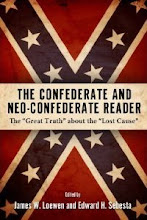President Barack H. Obama
The White House
1600 Pennsylvania Ave. NW
Washington, DC 20500
Dear President Obama:
The White House
1600 Pennsylvania Ave. NW
Washington, DC 20500
Dear President Obama:
During
your Presidency, you have annually sent Presidential wreathes to the Arlington
Confederate monument on Memorial Day. I am writing to ask you to stop this
practice. The United Daughters of the Confederacy regularly uses photographs of
your wreathes in its magazine accompanying
appeals to celebrate the birthday of Jefferson Davis and to honor Confederate
soldiers at an annual commemoration in Arlington. A Presidential wreath implicitly sanctions this
event and legitimates the Confederacy and its leader. Please
do not send a Presidential wreath to the Arlington Confederate monument in
2012.
Until
the administration of President George H. W. Bush, American presidents had sent
a wreath to the Confederate memorial on Jefferson Davis’s birthday: President
Bush ended this practice, instead sending a wreath on Memorial Day. Although
the wreath is no longer sent on Davis’s birthday (3rd June), Memorial Day is
close enough such that the wreath will likely still be on the Arlington Confederate
monument and it can be used to celebrate Davis’s birthday, as seen in the UDC Magazine in 2010 and 2011 (I enclose copies of the relevant pages).
When
the President of the Unites States sends a wreath to the Arlington Confederate
monument, the prestige of the monument is enhanced. It augments the celebration
of Jefferson Davis and justifies his beliefs and those of the Confederate
States he led. I urge you to end this practice. Jefferson Davis was a white
supremacist and fiercely pro-slavery. In Augusta, Maine, in 1858, for example,
Davis praised his audience for remaining racially pure, in contrast to Latin
Americans who he said were racially mixed and incapable of self-government.[1]
Davis opposed efforts to ban slavery in the Oregon territory in 1848 and, in a
lengthy Senate speech, described the inhabitants of Oregon and the newly
acquired territories from Mexico as “mongrels of the Spanish and Indian races,
inheriting from both the characteristics, pertinacity, treachery, and revenge.” [2]
He spoke out and voted against the African Squadron to suppress the transatlantic
slave trade.[3] He advised the Mississippi legislature in 1858
to secede if an abolitionist was elected president and to prepare by stocking
up arms.[4]
When Lincoln issued the Emancipation Proclamation, Davis denounced it as the “the most execrable measure recorded in the history
of guilty man” which he felt was “a measure by which several millions of human
beings of an inferior race, peaceful and contented laborers in their sphere,
are doomed to extermination.”[5] He advocated that captured
African American soldiers not be treated as prisoners of war, nor should their
officers.[6]
After the Civil War, Davis’s book, “The Rise and
Fall of the Confederate Government,” published in 1881, described African
Americans as racially inferior, argued that emancipation was a mistake, and claimed
it was an outrage that African Americans were allowed on juries and in state
legislatures. Davis died never regretting his lifelong fight for slavery, nor
altering his views regarding African Americans.
A
President of the United States should not be contributing to the celebration of
Jefferson Davis in any way, shape, or form. The annual sending of a wreath to
the Arlington Confederate monument by Presidents of the United States
contributes in a prominent way to perpetuating the celebration of Jefferson
Davis. I request that you no longer aid the celebration of Jefferson Davis.
Please do not send a Presidential wreath to the Arlington Confederate monument
in 2012.
Sincerely
Yours,
Edward
H. Sebesta
[1] Davis,
Jefferson, “Speech of Jefferson Davis at the Portland Convention,” Vol. 3
pages, 284-88, and “Speech of Jefferson Davis at State Fair at Augusta, Me. ,”
from the Eastern Argus, Sept. 29,
1858, reprinted Vol. 3, pages 312-314,
both from “Jefferson Davis: Constitutionalist, His Letters , papers, and
Speeches,” editor Dunbar Rowland, Mississippi Department of Archives and
History, Jackson, 1923.
[2] Davis, Jefferson, Speech on the
floor of the U.S. Senate, July 12, 1848,
Appendix to the Congressional Globe, 30th Congress, 1st
Session, pages 907-914.
[3] Congressional Globe, 31st Congress, 2nd
Session, pages 307-309.
[4] Rowland, Dunbar, “Jefferson Davis
Constitutionalist: His Letters, Papers, and Speeches,” Vol. III, Mississippi
Department of Archives and History, Jackson, 1923, speech on pages 339-360,
quotes on pages 356, 359.
[5] Dunbar Rowland, “Jefferson Davis to
the Confederate Congress,” from Jefferson Davis Constitutionalist: His
Letters, Papers, and Speeches, 5, (Jackson: MS Dept. of Archives and
History, 1923), 396-415. Also in the Journal of the Confederate Congress,
3, 58th Cong., 2d sess., 1904, S. Doc. 234, Serial 4612,
13-14.
[6] Official
records of the Union and Confederate Navies in the War of the Rebellion. /
Series II - Volume 3: Proclamations, Appointments, etc. of President Davis;
State Department Correspondence with Diplomatic Agents,etc., page 142.







